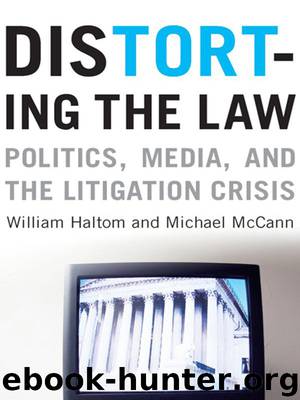Distorting the Law (Chicago Series in Law and Society) by William Haltom & Michael McCann

Author:William Haltom & Michael McCann
Language: eng
Format: mobi
Publisher: University of Chicago Press
Published: 2009-11-15T07:00:00+00:00
Reproduced at www.consumerfreedom.com/images/ads/lawsuit fat.jpg. Reprinted by permission of Consumer Freedom.
This conventional wisdom has become so powerful that even hard-boiled, realistic gatekeepers of the press seem beguiled by its fanciful logic (see Galanter 1998b). On June 16, 2003, U.S. News and World Report editor-in-chief Mort Zuckerman offered dual anecdotes about allegedly frivolous lawsuits to show that one “can haul anybody into court for just about anything these days.” The tort system, he contended, is rewarding cynical opportunists. However, as Washington Post media reporter Howard Kurtz soon revealed, drawing on the debunking Web sites Snopes.com and StellaAwards.com (the latter named in “honor” of the women who claimed to be burned by McDonald’s coffee), the anecdotes cited by the editor were fabrications or urban legends derived from Internet spam (Kurtz 2003). Contrary to journalistic norms, U.S. News did not deny that the cases were fabrications or offer a correction for its conflation of fiction and opinion in “Welcome to Sue City, U.S.A.” A spokesperson for the editor responded to the Post with remarkable bootstrapping: “These cases were reported in a variety of other reputable publications, such as the Fort Worth Star-Telegram and the London Telegraph, and Mr. Zuckerman could have cited dozens of other cases. . . . Few Americans would disagree with the proposition that there are far too many frivolous lawsuits filed” (Kurtz 2003, Ci). In other words, if everyone believes it, then the conventional wisdom must be true, or at least true enough to thrive in the juridico-entertainment complex. That a respected editor so readily adapted tort tales in a commentary and his newsmagazine was unabashed by his reliance on Internet fiction (provided that it had been reprinted in newspapers and conformed to a truism) illustrates how instrumental concoctions and the journalistic conclusions merge to reproduce common sense.
Download
This site does not store any files on its server. We only index and link to content provided by other sites. Please contact the content providers to delete copyright contents if any and email us, we'll remove relevant links or contents immediately.
Objection! by Nancy Grace(1328)
Anatomy of Injustice by Raymond Bonner(1267)
Apeirogon by Colum McCann(1237)
That Every Man Be Armed by Stephen P. Halbrook(1236)
Injustices by Ian Millhiser(1197)
The Vaccine Court by Rohde Wayne(1187)
Civil Procedure (Aspen Casebooks) by Stephen C. Yeazell(1171)
Storytelling for Lawyers by Meyer Philip(1133)
Restitution by Restitution(1111)
A Practical Guide to International Arbitration in London by Hilary Heilbron(1077)
Tangled Webs: How False Statements Are Undermining America: From Martha Stewart to Bernie Madoff by James B. Stewart(1025)
Coercing Virtue by Robert H. Bork(1022)
The Tools of Argument: How the Best Lawyers Think, Argue, and Win by Joel Trachtman(1022)
Broken Scales by Joel Cohen(1015)
INDEFENSIBLE: One Lawyer's Journey Into the Inferno of American Justice by Feige David(1009)
American Tragedy by Lawrence Schiller & James Willwerth(954)
A Religious Orgy in Tennessee by H.L. Mencken(947)
A Matter of Interpretation by Antonin Scalia(935)
Tangled Webs by James B. Stewart(921)
